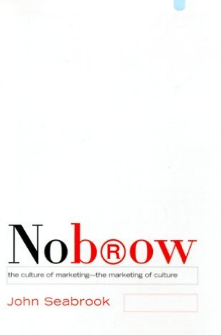 I recently read “Nobrow: The culture of marketing – the marketing of culture” by John Seabrook. Below are the quotes I found most interesting. If you like the quotes, buy the book here.
I recently read “Nobrow: The culture of marketing – the marketing of culture” by John Seabrook. Below are the quotes I found most interesting. If you like the quotes, buy the book here.
“For more than a century, this was how status had worked in America. You made some money in one commercial enterprise or another, and then to solidify your social position and to distinguish yourself from others, you cultivated a distaste for the cheap amusements and common spectacles that made up the mass culture.” (17)
“The old cultural arbiters, whose job was to decide what was “good” in the sense of “valuable,” were being replaced by a new type of arbiter, whose skill was to define “good” in terms of “popular.”” (26)
“In the United States, making hierarchical distinctions about culture was the only acceptable way for people to talk openly about class.” (27)
“One of Tina’s gifts as an editor was that she saw the American cultural hierarchy for what it really was: not a hierarchy of taste at all, but a hierarchy of power that used taste to cloak its real agenda.” (32)
“He knew how little difference between the Hileses and the Seabrooks there really was – which was precisely why these cultural distinctions were so important. This was true all over America. No one wanted to talk about social class – it’s in poor taste, even among the rich – so people used High-Low distinctions instead. As long as this system existed, it permitted considerable equality between the classes. Strip away that old cultural hierarchy, and social relations between different socioeconomic levels were harsher, because they were only about money.” (46-47)
”From Wordsworth to Rage Against the Machine, art created for idealistic reasons, in apparent disregard for the marketplace, was judged superior to art made to sell. For the artist, it was not enough to have a gift for giving the people what they wanted; to insure fame, the artist had to pretend not to care what the people wanted. This was difficult to do, for the artist, of every type, is as desperate for public approval as any human being.” (68)
“Oscar Wilde wrote, “A work of art is the unique result of a unique temperament. Its beauty comes from the fact that the author is what he is. It has nothing to do with the fact that other people want what they want. The moment that an artist takes notice of what other people want, and tries to supply the demand, he ceases to be an artist and becomes a dull or an amusing craftsman, an honest or dishonest tradesman.” (69)
“MTV helped make rebelliousness and anti authoritarianism a mainstream commodity.” (89)
“The kind of pop-cultural fanship that seemed so unnatural to Nathanael West and Ray Bradbury is just everyday life in the 90s. Without pop culture to build your identity around, what have you got?” (96)
“The artists themselves, who had once taken orders from the producers, now took orders from the marketers.” (106)
“Ironically, while the artists had won the means of production, in the resulting cultural deluge they’d lost the means of getting the audience to notice them.” (106)
“George C. Wolfe told me, “The whole concept of the journeyman artist has disappeared. You are not allowed to go on a journey. There is no journey. You’re either extraordinarily brilliant or you’re dead.”” (109)
“The irony of Star Wars was that as a result of its success, a movie as fresh and unknowing as Star Wars couldn’t get made twenty years later.” (150)
“The marketing is the culture and the culture the marketing.” (153)
“In Nobrow, judgements about which brand of jeans to wear are more like judgments of identity than quality.” (170)
“The purpose (at The Pottery Barn) is to create a dominant, mainstream identity that’s too bland to be really unique, but is enough to make these mass-produced objects feel special.” (173)
“Jimmy Lovine told me, “We all know that David Geffen’s really smart and really talented, but he’s also not afraid, or if he is he doesn’t show it. He’s more than willing to put all the chips on something he really believes in. ANd that doesn’t exist in the record business anymore. Because most people are afraid for their jobs, of the impact someone else can have on them.” (189)
“Because Geffen was not afraid, he was greatly feared.” (190)
“”Money does corrupt,” Jackson Browne told me. “God, as soon as you have a lot of money, you’ve got to figure out how to stay in touch with what you write and why you write. And if you always had the idea that money was going ot make a difference in your life, now you have to contend with the idea that it doesn’t.”” (191)
Liked the quotes? Click here to buy the book

